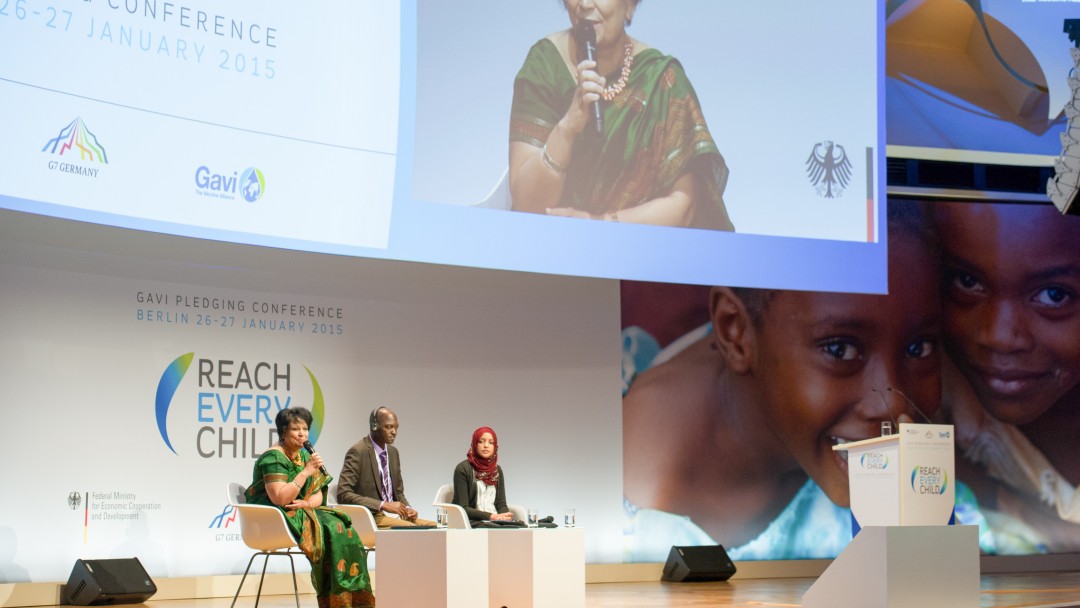News from 2015-01-30 / KfW Development Bank
Vaccination for every child
KfW health experts report on the Gavi conference
The most touching moment was when the huge figure was revealed. Country by country, donor by donor, the individual amounts that states and trusts wish to donate to Gavi, the global vaccination alliance, were called out. Germany contributed EUR 100 million more than was previously announced – EUR 600 million from 2016 to 2020. The Bill & Melinda Gates Foundation contributed EUR 1.55 billion. "Due primarily to the decline in the euro exchange rate, there were initially fears that the total amount of USD 7.5 billion dollars would be unattainable," says Annika Calov, a member of the KfW team that attended the Gavi conference on 27 January in Berlin. Gavi needs such a huge sum of money so it can vaccinate 300 million children against whooping cough, measles and respiratory diseases over the next five years, thereby preventing up to six million deaths. Finally, the CEO of Gavi, Seth Berkley, proudly announced the grand total of "USD 7.539 billion". It was more than everyone had dared to hope for. There was a huge round of applause and great relief.
Gavi, otherwise known as the Global Alliance for Vaccines and Immunisation, is headquartered in Geneva and was founded 15 years ago by governments of industrialised and developing countries, the World Health Organization, the Bill & Melinda Gates Foundation, Unicef, the World Bank and other private and public institutions. Since then, Gavi has immunised 500 million children and thereby saved the lives of seven million people. "The success of the development cooperation is evident in this respect," says KfW Director Helmut Gauges. "Vaccinations are the most effective means of prevention and we are proud to play an active role in reducing child mortality."
Together with the Bill & Melinda Gates Foundation, KfW Development Bank, using the funds of the German Federal Government, has been financing vaccines for Tanzania since 2011 and for four other countries in the East African Community since 2014. The development cooperation has also been extended to improve logistics management for transporting the vaccines. "However, developing the vaccine and negotiating the best price with the pharmaceutical companies is not enough," says KfW healthcare expert Arlina Elmiger. "It has to be transported – refrigerated – to even the remotest of villages." Special expertise and know-how are required to make sure that the entire chain functions seamlessly. So, together with the East African Community, KfW has a new project in the pipeline to set up a training centre in order to improve logistics in the healthcare sector.
Financing new technologies
Furthermore, by means of the Global Health Investment Fund (GHIF), KfW is also financing the development of new technologies, such as vaccines against cholera. In future, it will potentially finance new equipment too – one example being innovative refrigeration bags for refrigerating vaccines. "The global community will soon have eradicated polio, although the last few hundred metres are proving to be the greatest challenge of all," explains Ms Elmiger. Indeed, many villages are so isolated that the costs are disproportionately high. So, in order to strengthen the entire system, alongside the multinational initiatives, specific projects between the individual donors and the developing countries are extremely important.
"It was impressive to witness the international importance attributed to global health by the conference participants and to see the level of commitment of each individual as well as the event organiser," says Annika Calov. In her speech, the Deputy CEO of Gavi, Anuradha Gupta, explained that when she was a child her sister died from measles because she had not been immunised. She herself survived. And that is precisely why she is striving to increase the immunisation rate in developing countries. Initially starting with her native country, India, where lots of children have still not been immunised, and today working with Gavi on a global scale.
The list of conference participants also demonstrates that this is a matter of high priority. The Federal Chancellor was joined by the Presidents of Tanzania and Mali, as well as the Norwegian Prime Minister and Bill Gates. Quite a few of the countries promoted by Gavi were also represented, since they contribute some of the funds and will make even greater contributions once their economic strength has grown.


Share page
To share the content of this page with your network, click on one of the icons below.
Note on data protection: When you share content, your personal data is transferred to the selected network.
Data protection
Alternatively, you can also copy the short link: https://www.kfw-entwicklungsbank.de/s/enzBWrMC._HB
Copy link Link copied